… narratives about ‘Big Coal & Oil paying skeptic climate scientist shills to spread disinformation’ are purged of all distracting details which prompts the public to take their eyes off the basic thrust of the accusation. If enviro-activists want to convince everyone that skeptic scientist villains have zero credibility after being caught working within ‘fossil fuel industry disinformation campaigns,’ that’s the ultimate victory they must achieve, because they begin to look like sinister villains themselves if cancerous credibility holes are found in various parts of the accusation.
Summarizing this series: My overall backgrounder for the leaked American Petroleum Institute’s (API’s) notorious “Victory Will Be Achieved …” memos shows how their alleged goals are little more than simple truisms and not sinister industry directives for henchmen to follow, and that the memo set was never implemented, nor were its goals even solicited by oil company executives. My Part 1 continuation detailed how this worthless memo set re-emerged in a problem-laden 2018 podcast by a moderately prominent journalist. Part 2 explained the massive timeline problem on who discovered this worthless memo and who was first to put it online – Greenpeace or the National Environmental Trust. Today: Part 3 — how did the late Evert Wesker end up having a brief starring role in this situation?
If only Wesker’s name was the equivalent to the overlooked name for the security guard credited with foiling the burglary of the Democratic National Committee offices at the Watergate building. No matter how many inquiries could have been made about the guard’s role, none would ever undermine the inevitable and irrefutable revelation about President Nixon’s corruption.
The problem here is that this leaked API memos situation instead compares to any inquiry into the infamous leaked “reposition global warming” memo set — dare to ask what secured the Pulitzer award for the so-called ‘discoverer’ of those memos, and it’s revealed as a false award accolade for the discoverer, while additional inquiries ultimately reveal how the memos he ‘discovered’ were not actually part of any alleged disinformation conspiracy, and are therefore worthless as evidence for that. Thus it follows that the person famously credited with discovering them should be open to serious scrutiny, along with the people who tried to enhance the accusation narrative with that seemingly tailor-made “Pulitzer-winner” accolade.
The API “Victory Will Be Achieved …” memo is every bit as worthless, so it is worthwhile to ask — as I pointed out in Pt 2 — why two separate and otherwise unrelated enviro-activist groups appear to have independently leaked the API memo …… along with some guy named Evert Wesker.
Evert who?
He was a Dutch climate activist who died in 2017, but obituary stories about him make no mention of his role in this leaked API memo matter.
His brief fame in the 20 year smear of skeptic climate scientists apparently resulted indirectly from the Union of Concerned Scientists’ huge January 2007 “Smoke, Mirrors & Hot Air” scathing report about alleged fossil fuel disinformation campaigns. Its portrayal of the “Victory will be achieved …” memos was unmistakable:
A 1998 GCST task force memo outlined an explicit strategy to invest millions of dollars to manufacture uncertainty on the issue of global warming – a strategy that directly emulated Big Tobacco’s disinformation campaign. … (For full text of the memo, see Appendix C.)
Strangely, Wesker’s name does not actually appear in the report, despite such the seemingly bombshell revelation about the memos. What is seen, however, in UCS’ Appendix C? Only the same website address ….
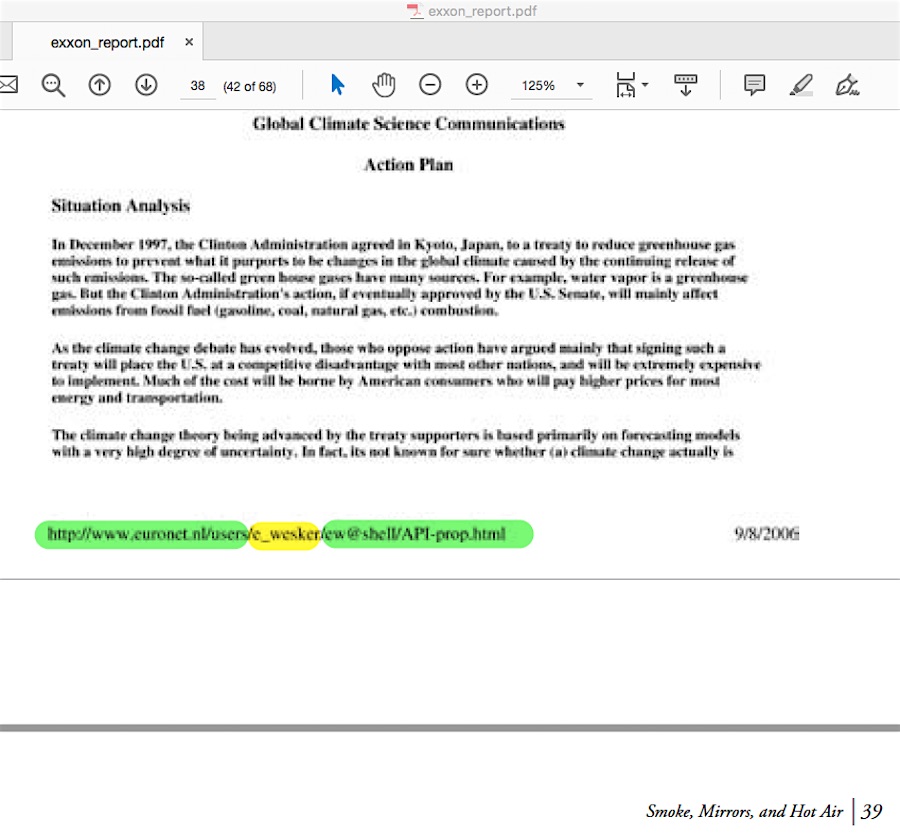
…. as the one I showed at the very end of my Part 2 post, where Desmogblog’s James Hoggan featured that link after his errant attempt to pin the discovery to Greenpeace while trying to alleviate the problem with Greenpeace’s terrible scan copies:
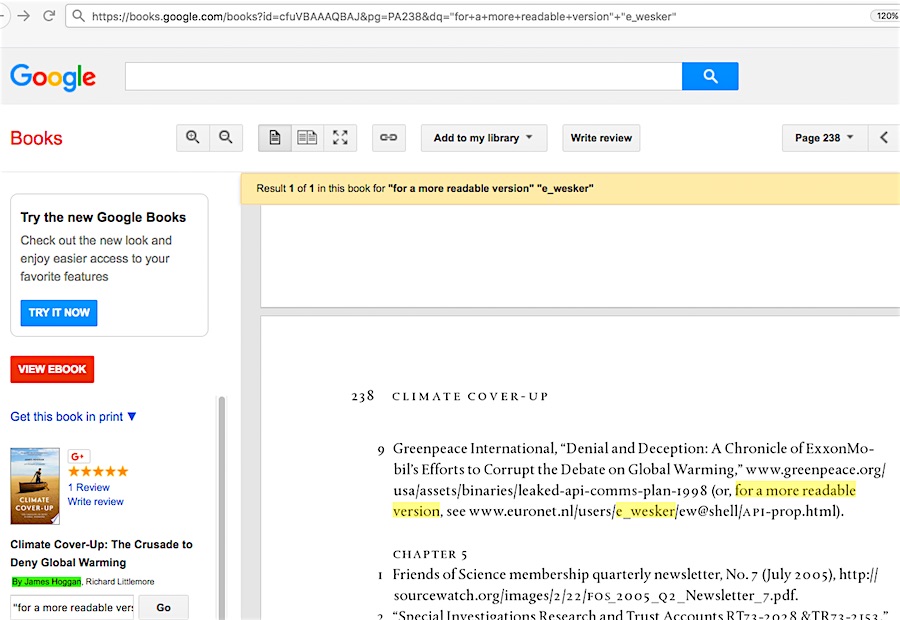
Just like the UCS report, Hoggan doesn’t say who Wesker is or why that link goes to a site with the basic root address of “euronet.nl/users/e_wesker.”
Do an extensive search for the specific website address that UCS and Hoggan use, and it’s obvious how frequently and widely it was cited in the past as a source for reading those memos, and how all those results date no earlier than UCS’ 2007 citation. Wesker’s website address, incidentally, stopped functioning quite some time back, as noted by this 2018 book author:
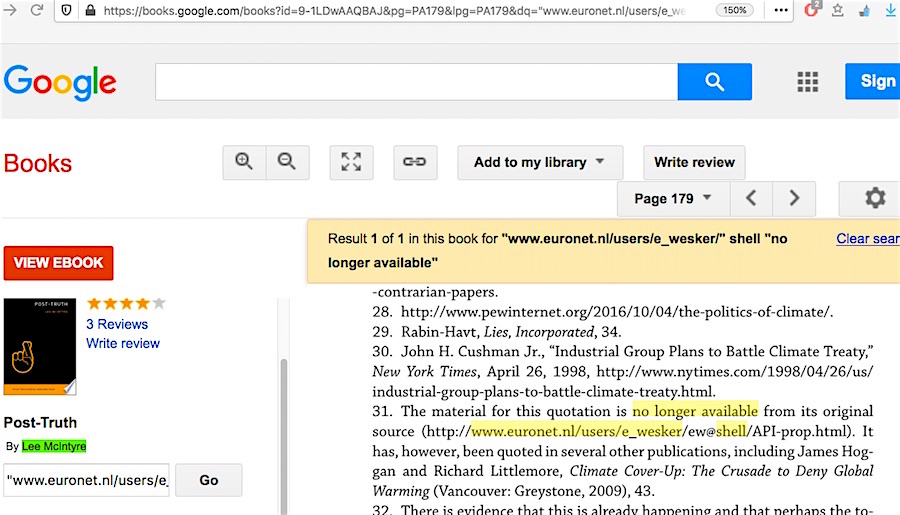
The Internet Archive system’s link for it does work, and its earliest capture only displays the following at the top:
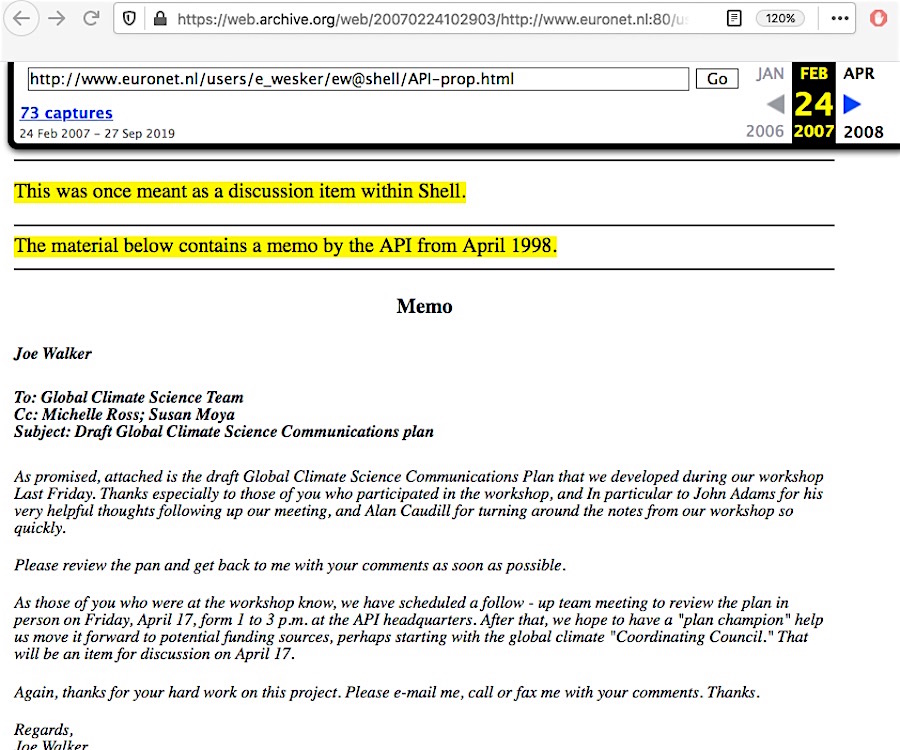
The memos are so easy to read is because they’re all in computer text, not scan copies. However, the elemental problem there is Wesker said nothing more about the memos at this website page. It only gets worse in rummages among the Internet Archive system’s other captures of Wesker’s site. Much of his site is written in Dutch, even after gaining fame when his API memos page link appeared in UCS’ 2007 report.
Good luck trying to find any of Wesker’s explanations at his site on why he has the text for these memos or if it was a surprise to him that UCS linked to his page. Even after using Google Translate to read his various pages, I have yet to find any telling the story of how he found these API memos, or who he alerted about them.
The big bombshell breakout story for these API memos was John Cushman’s April 26, 1998 New York Times article, “Industrial Group Plans to Battle Climate Treaty” …. which neither mentioned Wesker, nor did it actually quote any specific line from the memos, including its most famous “Victory will be achieved …” one. Unless I’ve missed it within the archive captures of Wesker’s site, he never mentions the NYT‘s story, or any sudden rise of people people looking at his site in late spring 1998 to see what the memos said.
Among all my attempts to see if Weaker said anything detailed about the memos, I found the following comment from him at a June 2005 Dutch language climate issue site, where he responded to news about Greenpeace’s discovery of President George Bush being pressured by the oil industry to reject the Kyoto Protocol. Google Translate provides the English words, the highlighting emphasis is mine. The original Dutch text embedded his now non-functional link for his API memos webpage in the word “tekst”:
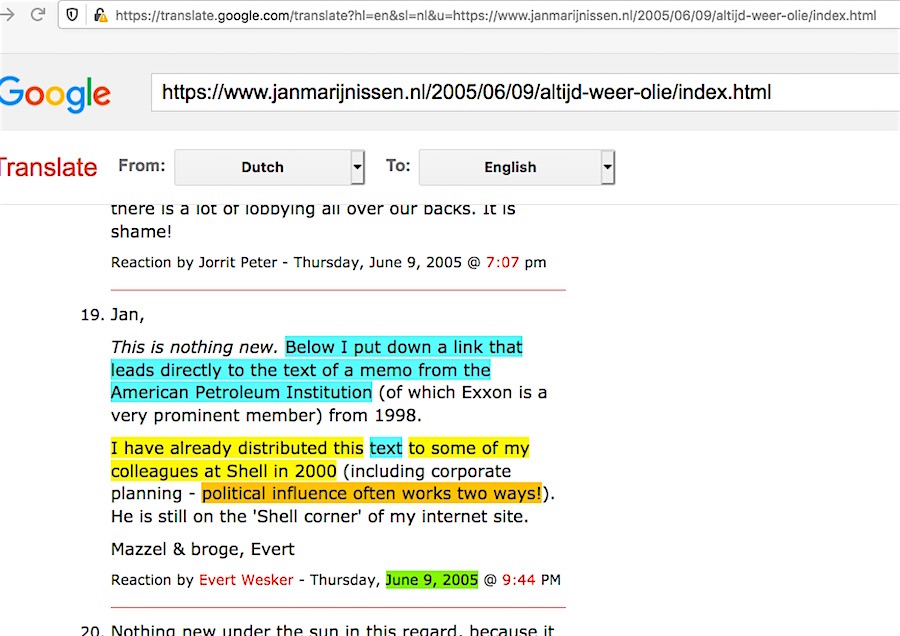
“Distributed this text to some of my colleagues at Shell in 2000…” Hold that thought about the distribution time for a moment.
Wesker’s label of this material as “text” rather than “leaked documents” prompts another question. In my Part 2 blog post, I showed how the National Environmental Trust placed all of the memos’ text online the same day John Cushman’s NYT article was published. Are there differences between Wesker’s online text and the NET’s? If either Wesker or NET people transcribed the printed memos into computer text or used different optical character recognition software to change the print into computer text, you’d expect to see significant differences resulting from physical typos or words that a computer scanner wouldn’t recognize.
Wesker’s page for the complete memos, as seen above, is headlined by just two sentences and the word “Memo.” The NET’s page has a press release written in news article style before the memo text, with the words “Memo Follows” after that. Copy all of the remaining text from each website page starting with the name Joe Walker into the DiffNow site’s comparator, and what differences are seen?
The NET version of the memos text adds the date “April 3, 1995” after the Joe Walker portion of the memos, and the NET version contains two additional dashes and a stray right-pointing side arrow character which Wesker’s version doesn’t have. And. That. is. It. Full report / text comparison here, with the differences highlighted in purple within gray boxes.
An elemental question arises from that exercise: did the NET people copy the text from Evert Wesker, or did Wesker copy it from the NET? As I noted in my Part 2, the website page for the NET’s copy of the text had disappeared in early 2000, so Wesker was perhaps unable to share the NET’s text page with his fellow Shell colleagues at that time, but had kept a copy of their online text for his own use.
However, notice that I highlighted the “5” in what appears to be the additional “April 3, 1995” that the NET version has, which Wesker’s text doesn’t have. Who also has a date added after the Joe Walker portion of the memos? Greenpeace’s lousy scan copies, where the errant number is clearly an “8” – click on their thumbnail page 3 here, it’ll open up a full view below on that webpage. Notice how the “Global Climate Science Communications Action Plan” heading’s scanned words have overlaid with computer-generated, perfectly level text, but that the word “Science” is still misspelled.
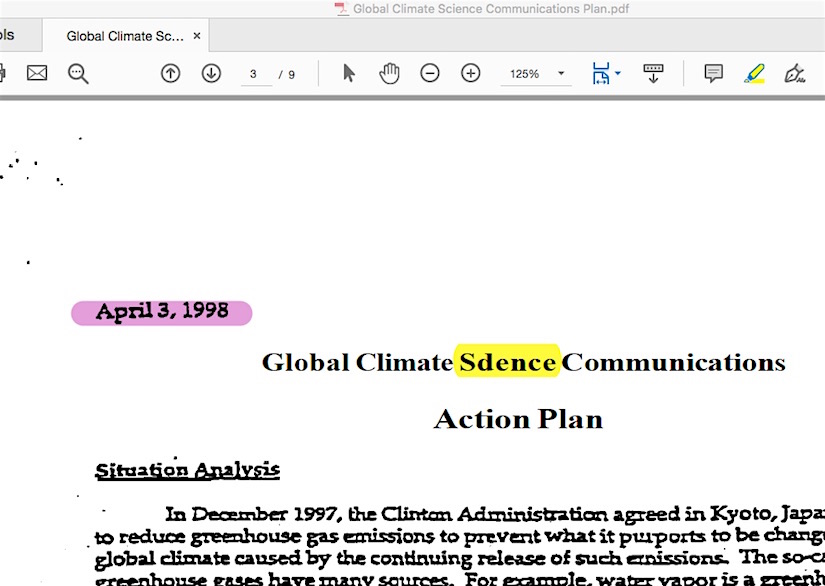
It gets worse. Regarding the NET’s text showing extra dashes and side arrow, page 6 of Greenpeace’s scans seems to indicate that perhaps those were results of optical character recognition faults. What the NET shows as a period is a colon in Greenpeace’s scans, and the OCR software probably didn’t know how to interpret the single long dash. But notice how there are even more obviously computer-generated replacements overtop words that Greenpeace’s scans probably showed as unintelligible blobs.
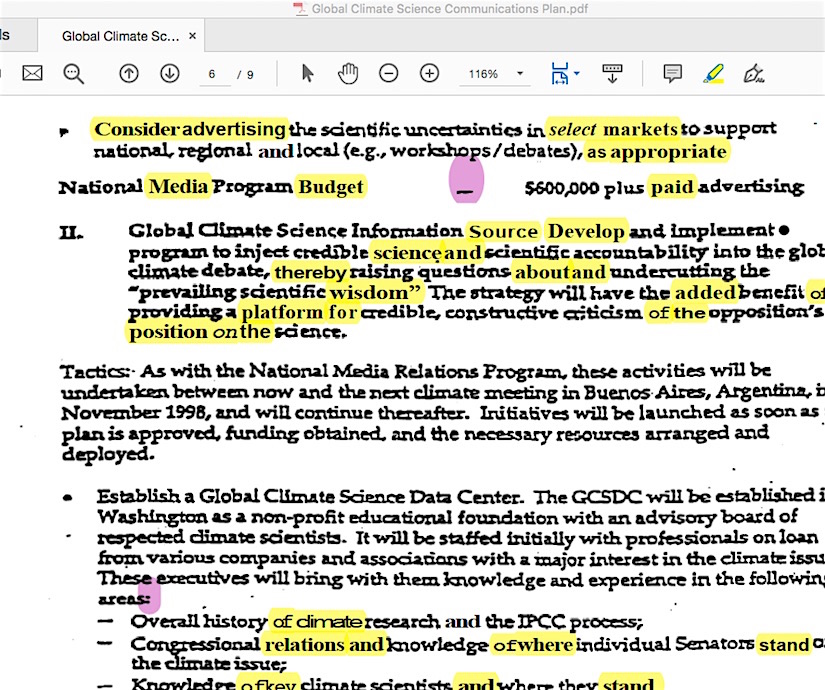
Now, the question is, considering how Greenpeace’s otherwise lousy scan clearly shows the memos date as April 3, 1998, did the NET copy the text from Greenpeace scans using OCR that produced the “5” from that date?
Unfortunately, the Internet Archive system didn’t preserve the scan images at the NET’s pages, and I find no evidence that Evert Wesker’s site ever showed scanned images of the memos. Similar to how Wesker is no longer available for questioning on this, neither is Phil Clapp, head of NET at that time, who said unequivocally that his NET – not Greenpeace – had obtained copies of the memo “from an industry official.”
Yes, Wesker worked for Shell, but the situation isn’t that simple. It’s obvious from one of his alternate website posts that he was a believer of man-caused global warming, channeling both Naomi Oreskes’ 100% consensus and Ross Gelbspan’s ‘skeptic scientists don’t deserve equal media time’ narrative. Did Wesker’s political leanings also factor into his involvement? These aren’t trivial details in this matter. Sincere whistleblowers alert the media about genuinely troublesome internal documents that reveal sinister intent. It’s plausible that enviro-activists leak documents that are little more than truisms to like-minded eco-zealots so that they may be taken out-of-context and portrayed as directives for misinformation campaigns. “Political influence often works two ways!”, Wesker said. Flip the truisms 180 degrees, and it’s easy to see why they are worthless as evidence of sinister energy industry intent.
Putting details of Wesker’s personal life aside, however, we still have a basic problem.
I said in Part 2 that Greenpeace’s August 1998 “The Oil Industry and Climate Change” had API memo scans that were hard to read. That’s an understatement, actually.
Clearly, the memos were online in easy-to-read computer text at the NET’s page that year, albeit with the NET taking credit as the memos provider for the bombshell New York Times article. Why not simply copy only the memos text, correct the NET’s errant “April 3, 1995” date, and paste it into a Greenpeace webpage so that people around the world can link to it? Funny how the search results for the NET’s 1998 press release / full memo text webpage, which was likely sent out to reporters and enviro-activist groups around the world, can be counted on the fingers of one hand, while there’s a minimum of seven pages of 10-per-page Google search results for citations of Wesker’s website page address that first date from nearly a decade after the NYT‘s supposedly ‘bombshell’ article.
Is Evert Wesker the equivalent of the security guard who foiled the burglary of the DNC offices at the Watergate building? The exact story of his role isn’t told anywhere. Truth is, regarding who first found, leaked, and publicized these API memos, there’s nothing but questions surrounding that, made all the worse by API officials saying the memos were unsolicited* and never used. [*Author’s 5/13/21 note: this is corrected/clarified here]
This cannot be emphasized enough: No matter where any objective person approaches the ‘crooked skeptic scientists scheming with oil and coal executives to misinform the public’ accusation, the examination always reveals increasingly troublesome problems with the entire narrative.
————————————————————————
Part 4: Greenpeace people were for their API memos scans before they were against them. And Evert Wesker was for Shell before he was against Shell.
